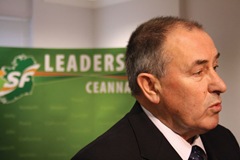Sinn Féin’s economic plan
 agendaNi unpacks Sinn Féin’s economic plan.
agendaNi unpacks Sinn Féin’s economic plan.
Resistance to British cuts, Sinn Féin’s previous stance, is still a theme in ‘There is a better way’ but receives much less publicity than before. The party accepted that a £1.9 billion gap would need to be filled and its overall approach is to invest strategically out of a recession, rather than “slash and burn”.
The party is also candid about Ireland’s current economic status i.e. “two failing economies competing back-to-back” but blames the border, warning that “continued partitionist economics will fail another generation.” Quietly, the party supports the UK Government’s enterprise zone commitment, while expressing scepticism that this will come about.
Progress on the Education and Skills Authority and local government reform is demanded, to save up to £480 million. A smaller but symbolic move would cut political salaries and expenses by 15 per cent (£7.5 million over four years).
External consultants should only carry out work which the Civil Service cannot do itself. Any consultancy must be approved by the relevant Minister and fees must be reduced from current levels. Public sector high earners would also face a pay freeze.
The phone mast tax received the highest profile, with claims that it will generate £160 million over four years. This breaks down into £2,000 per month for each of the 1,700 masts. Sinn Féin also calls for a plastic bag tax, following the southern example.
Allowing the Housing Executive to borrow against its rents could raise up to £250 million, it is claimed, and therefore make the social housing budget “largely self-financing.”
“Responsible asset realisation” is also suggested, with borrowing against the current value of assets to generate income until property prices rise again.
The four main banks, it suggests, could invest £400 million over four years (£25 million per bank per year) in a sustainable economic development bond. Likewise, Sinn Féin proposes a £100 million social fund, created by the credit union movement.
European funding must also be maximised, with €100 million drawn down from the Seventh Framework R&D programme. Other sources include the Jeremie, Jessica and Progress funds. The EU’s R&D target – 3 per cent of GDP by 2020 – must also be adopted locally, it states, backed up by tax incentives.
Providing all-island public services would reduce administrative duplication and costs. Sinn Féin says that economic and tourism development agencies should be merged and recreated at an all-island level.
All-island working would also involve developing export and innovation strategies, a job creation plan, public procurement and waste management. The North/South Ministerial Council is seen as having a key role; the party is discussing its ideas with the Irish Government in ongoing talks.
Sinn Féin supports reliefs (such as free prescription) as an “important part of helping people and businesses in difficult times.” Shared services must take place within the public sector and “unnecessary quangos” abolished; a specific list was expected by early November.
Some proposals depend on Executive agreement while others need the banks’ and credit unions’ agreement, which is uncertain. O2 described a mast tax as “counter-productive.”
The document’s launch was welcomed, as a contribution to the debate, with most other parties open to discussing its proposals. It was not clear, though, that the sums would add up to £1.9 billion and opponents criticised its ‘late’ publication just six days before the Comprehensive Spending Review.
A party spokesman defended the timing, saying the plan was “well researched and well thought through” beforehand.





